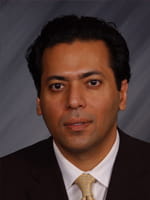Data Shows Procedure for Severe Asthma Sufferers Provides Long-Term Relief
One in 12 people has asthma, according to the Centers for Disease Control and Prevention, but recent data shows a 7-year-old procedure called bronchial thermoplasty is giving people with severe asthma long-term relief from future flare-ups.
Typically, people with asthma rely on quick-relief inhalers, inhaled steroids and anti-inflammatory medications to control symptoms or prevent future asthma attacks. However, bronchial thermoplasty, which the FDA approved in 2010, has been shown to reduce severe asthma flare-ups for at least five years.
Bronchial thermoplasty is for adults 18 and over with severe, persistent asthma who require steroid inhalers and other medications to manage their condition. People with severe asthma have extra smooth muscle tissue around their airway and inflammation that causes their airway to narrow during an asthma attack, leading to difficulty breathing.
Bronchial thermoplasty uses radiofrequency heat to treat severe asthma. During treatment, we place a catheter with a bronchoscope (a flexible instrument with a camera) into the airway to deliver ultrasound frequency to heat the smooth muscle and reduce its thickness so there’s less airway constriction. Only about one-third of the targeted lung area can be treated during each procedure, so it takes three sessions to do a full treatment. During the first session, we treat the lower right lobe. Three weeks later, we do the lower left lobe. After another three weeks, we do a final session to treat the upper right and left lobes.
Results of Bronchial Thermoplasty
Just two years ago, this procedure was still thought of as relatively new, but now we have data to prove how well it works.
Previously, people with severe asthma had to rely on a high-dose steroid inhaler, long-acting bronchodilator or medications like Xolair to treat their asthma. Many often ended up in the emergency room, which resulted in a limited lifestyle and missed work, school or disruption of their everyday activities.
However, research indicates that this non-medication treatment for asthma is producing effective results for patients. One year after treatment, patients have a 32-percent reduction in severe asthma attacks and an 84-percent decline in emergency care for respiratory symptoms. They also had 66 percent fewer days lost from work, school or other activities because of their asthma, and experienced a 79-percent improvement in their quality of life.
This outpatient procedure does come with some side effects, though rare, such as a potential asthma flare-up after treatment. However, the positive results we’re seeing are huge for patients, and the fact that these results last at least five years is even more significant for the management of their condition long term.
About 235 million people worldwide have asthma and as of 2012 more than 650 people in the U.S. have been treated with bronchial thermoplasty. In the last few years, bronchial thermoplasty has become an even more acceptable form of treatment for people with severe asthma, so it’s likely that this procedure will help even more patients in the future.
Here in Florida, asthma is very common because of all the greenery here and the high pollen count throughout various areas of the state. Humidity, which is frequent in Florida’s climate, also affects asthma because it dries up the airways and causes flare-ups. Many people with allergy-induced asthma can control their symptoms with an inhaler, but for those with severe flare-ups, bronchial thermoplasty is a worthwhile option. We now offer the procedure at Dr. Phillips Hospital and at two hospitals in the Orlando Regional Medical Center system.
Have more questions about bronchial thermoplasty?
The Orlando Health Pulmonary and Sleep Medicine Group provides you with a wide array of consultative, diagnostic and therapeutic services for pulmonary or sleep-related disorders. Our highly trained physicians are board certified in a variety of specialties, including pulmonary, critical care and sleep medicine.
Request an Appointment

